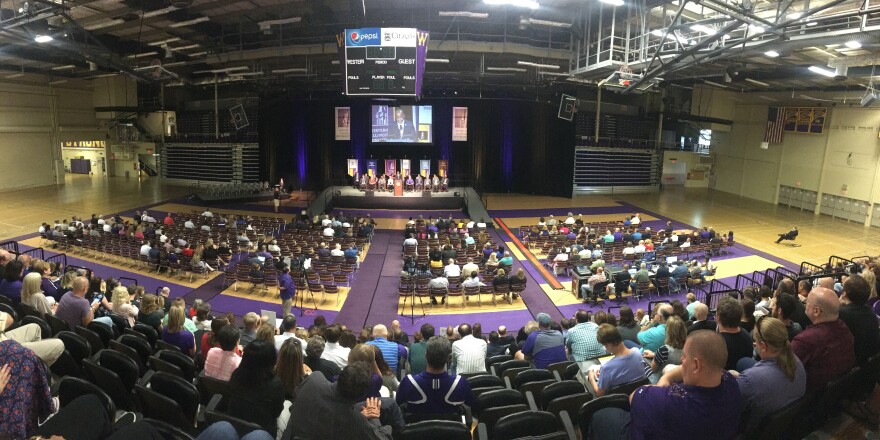Western Illinois University’s president used his State of the University address during Thursday's University Assembly to say this will be a year of change at the institution.
“(There are) a number of things that we’re going to have to do in the future to continue to make this university viable and to continue to provide the world class and quality education that we are known to provide,” Dr. Jack Thomas told reporters after the speech.
He pointed to the academic realignment plan unveiled last month as the new direction his administration envisions for Western.
Thomas also called for people to be positive when talking about Western, though he acknowledged to reporters that challenges remain.
“We have made cuts and we will have to continue to make those cuts and we will do the necessary things that we have to do,” he said.

Deficit Spending
Thomas said Western’s deficit spending was $4 million during Fiscal Year ‘18, which ended June 30, 2018. He said the school projects deficit spending for this fiscal year too, though he declined to say how much because the administration is still working on it.
Thomas said Western has become a tuition-dependent university because of declining state financial support. He also said Western will continue seeking other sources of funding.
“We have experienced almost two decades of decreased state funding. We are changing to adapt to this new reality as fast as contracts and the law allow,” Thomas said during his speech, which was given to faculty and staff members at Western Hall on the Macomb campus.
Student Enrollment
Dr. Jason Woods, Associate Vice President for Student Services and Interim Director of Admissions, said more than 900 new freshmen are enrolled for the fall semester along with 750 new transfer students and 550 new graduate students. He said those figures are larger than ones projected in March.
Woods did not have projections for overall student enrollment.
Academic Realignment
Western’s administrators have unveiled an academic realignment plan to guide the university, but faculty leaders are still confused about the path forward.
During the University Assembly, Interim Academic Provost Kathy Neumann once again outlined the realignment plan which identifies 37 different areas as 'centers for excellence.'
“In order to determine what path to take at this current crossroads, we must evaluate the outcomes of where we have come from. As we look at where we have been, we see strong and successful outcomes in the academic areas of business, education, community service, science and technology,” Neumann said.
The administration did not take questions from the audience during the assembly, nor did they last month either, when the plan was first unveiled during a press conference.
That event left many Western faculty and staff puzzled and they quickly turned to social media to express their confusion and pose questions about the proposed new academic structure.
Faculty Response
Faculty Senate Chair Dr. Christopher Pynes told Tri States Public Radio following the University Assembly that he agrees the university should look to reorganize. But he said the administration is going about it in the wrong way.
“They’re supposed to produce the vision and get everybody on board to work toward that vision and I think that is what is lacking. There was no plan. There was no vision. What happened was is they said we are going to do this with no input and it took everybody by surprise,” Pynes said.

He said faculty should not have been given details about the realignment plan for the first time in a press conference setting.
Pynes said faculty should have been involved in the process from the beginning as per university policies and procedures requiring shared governance.
“One of the reasons that Universities aren’t businesses is because administration or leadership can’t just make unilateral decisions. There’s a concept of shared governance and what has to happen is best practices in disciplines have to go through the process of an evaluation and decision procedure. This is how all universities work,” Pynes said.
Pynes said he would like to see an explanation from the administration about how the decisions were made and why they’re the best option for WIU.
Pynes said several members of the Faculty Senate plan to push to make sure faculty have their voices heard regarding any changes to the curriculum or structure of the university.
UPI Response
Bill Thompson, President of Western’s chapter of University Professionals of Illinois (UPI), which represents faculty, said there is also language in the union’s contract that requires faculty be consulted when changes are proposed to the academic structure.
“Contractually, this process is supposed to start within the departments and work its way up,” Thompson.
Thompson said the administration could have reached out to each department last year and told them about the potential for reorganization and asked for the faculty’s thoughts. But, he said that did not happen.
“Faculty feel like they have reversed the process. They started at the end that they want and now they are going to ask for input that more or less confirms what they already have done,” Thompson said.
Public Input Regarding Realignment
Provost Neumann said during the University Assembly that the realignment plan is something to work toward and that there will be many discussions through town hall meetings, advisory groups, and governance groups in the future to provide observations, suggestions, and feedback.
Thompson said that is a nod toward faculty. But he worries that the administration’s mind is already made up and those meetings will not result in any big changes but rather only small tweaks to the realignment plan.









